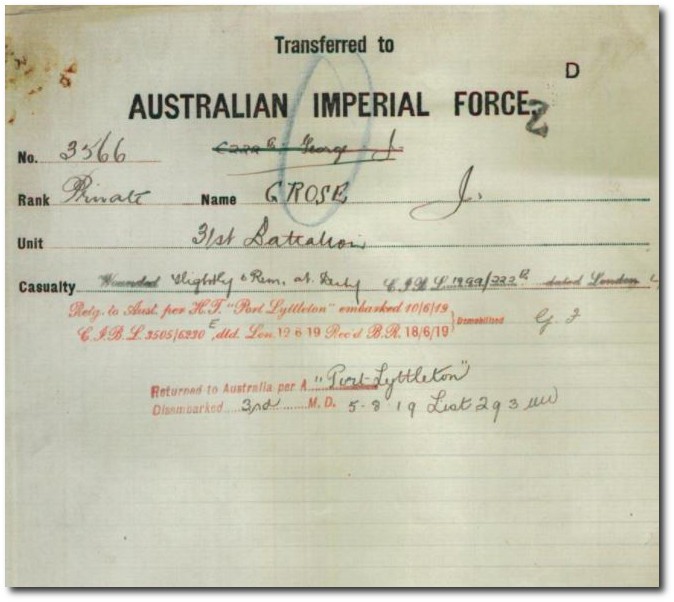
Indigenous Australian, Jack GROSE, 31st Infantry Battalion
Jack (John) GROSE was born in Gunnedah, NSW in 1881 to Rachel Grose, who died two weeks after giving him life. When he volunteered to serve with the first AIF in January 1916 he named his friend and employer Archie Robinson as his next of kin. Prior to enlisting Jack had been working for Archie Robinson on his property in Rosewood, near Goondiwindi in southern Queensland. Robinson was a well known figure in the district, a former teamster, who after the introduction of the railway to the area, became a successful wool grower and horse breeder.
After enlisting in Warwick, Grose trained at Thompson's Paddock, Enoggera before embarking with the 8th Reinforcements for the 31st Infantry Battalion, on board HMAT Boorara in August 1916, arriving in England two months later.
When he joined his battalion in France in March 1917, the allies were advancing on Bapaume and Bullecourt, the Germans having retreated to the Hindenburg Line. They found Bapaume all but destroyed by the retreating forces, and booby-trapped buildings. Infantrymen including Jack Grose were mustered to construct a Light Railway for the transport of stores and ammunition to the area.
Grose was wounded in action in July 1917 but remained on duty. He came through virtually unscathed for the rest of the war, although he did contract influenza in the winter of 1917/1918 for which he was treated in the field. At the end of the war he was granted two weeks leave to London and on his return was assigned to the Divisional Salvage Company in France for three months.
Jack Grose was repatriated home in September 1919 and returned to his employment at Rosewood. Jack never married and remained in the area until the 1940s; he died in Moree in 1949.
Read more ...
- Service record: GROSE, Jack
- Embarkation roll 8th / 31st Infantry Battalion
- Unit War Diary: 31st Infantry Battalion March 1917
- AWM Video of Bapaume to Bullecourt
- Scarlett, Philippa. Aboriginal and Torres Strait Islander volunteers for the AIF: the Indigenous response to World War One. Fourth edition, Indigenous Histories, Macquarie, ACT, 2018
- One of the soldiers featured in SLQ’s HistoryPin Collection
- Queensland’s Indigenous Servicemen Digital Story and Oral History
The information in this blog post has been researched by State Library staff and volunteers, it is based on available information at this time. If you have more information that you would like to share or further research uncovers new findings, this post will be updated.
Comments
Your email address will not be published.
We welcome relevant, respectful comments.